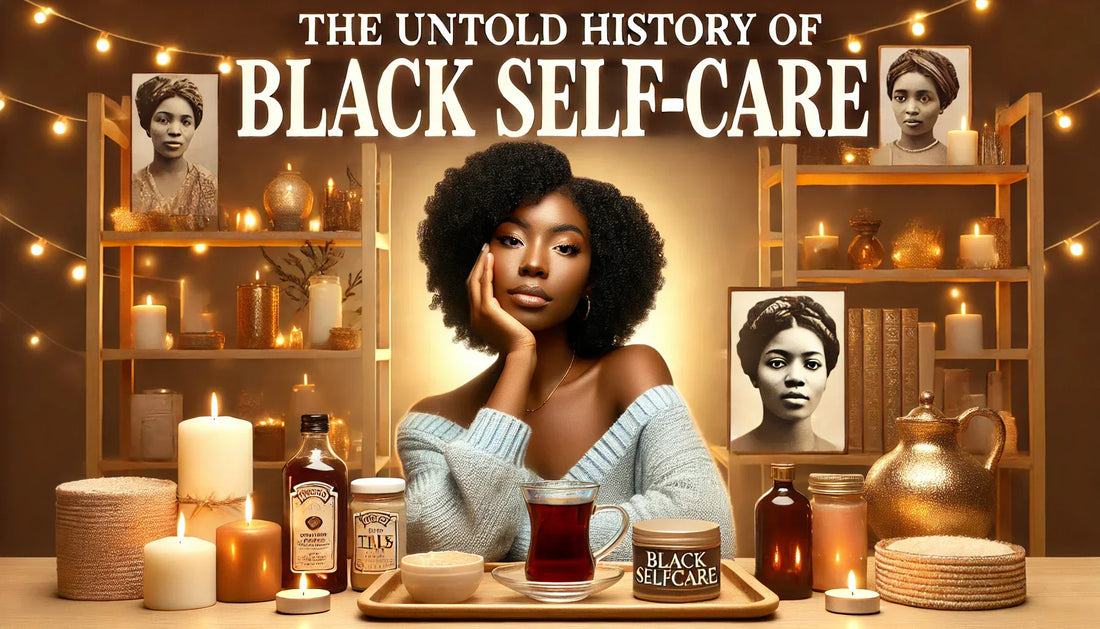
Radical Self-Care: A Legacy of Healing, Resistance, and Empowerment
Share
“Caring for myself is not self-indulgence, it is self-preservation, and that is an act of political warfare.” – Audre Lorde
In today’s fast-paced world, self-care is often marketed as bubble baths, luxury spa treatments, and expensive wellness retreats. But for Black people—especially Black women—self-care has always been about more than relaxation. It is an act of survival, a radical declaration of worth, and a way to reclaim control over our bodies, minds, and spirits.
The concept of radical self-care challenges the idea that taking care of oneself is a luxury. Instead, it is a necessity deeply rooted in history, community, and resilience. From Harriet Tubman’s herbal healing to the Black Panther Party’s free health clinics, self-care has always been a tool of resistance, healing, and empowerment.
What Is Radical Self-Care?
Radical self-care goes beyond individual pampering—it is about holistic wellness and intentional healing in the face of systemic oppression. It means:
• Prioritizing mental, physical, and emotional health despite societal demands.
• Establishing boundaries to protect peace and well-being.
• Honoring ancestral wisdom in healing practices.
• Understanding that self-care is community care, and our wellness uplifts those around us.
Black History & Self-Care as Resistance
1. The United Order of Tents: Secret Sisterhood & Healing Spaces


Founded in 1867, the United Order of Tents was a secret society of Black women that provided healthcare, housing, and burial services for newly freed enslaved people. This group created safe spaces for Black women to heal, build wealth, and care for their communities in a world that actively excluded them from mainstream wellness spaces (Jones, 2015).
2. The Black Panther Party: Community Wellness & Free Healthcare


In the 1960s and 70s, the Black Panther Party viewed healthcare as a human right and self-care as a revolutionary act. They established People’s Free Medical Centers, offering access to healthcare, nutrition programs, and acupuncture—particularly in underserved Black communities. Their Sickle Cell Anemia Screening Program also brought awareness to a disease that disproportionately affects Black people, highlighting the importance of self-advocacy in health (Nelson, 2011).
3. Harriet Tubman: Herbal Healing & Rest as Resistance

Harriet Tubman was not only a freedom fighter but also an herbalist. During her time on the Underground Railroad, she used natural remedies such as yarrow and wild cherry bark to treat wounds and respiratory illnesses. She learned these practices from African and Indigenous healing traditions, which were essential for survival when access to medical care was denied to enslaved people (Hume, 2021).
In addition to her use of herbal medicine, Tubman understood the power of rest as resistance, something that has become central to today’s radical self-care movement. Activists like Tricia Hersey, founder of The Nap Ministry, emphasize that rest is a form of reparations and a rejection of grind culture that exploits Black bodies (Hersey, 2022).
4. Audre Lorde: Self-Care as Political Warfare

Poet and activist Audre Lorde redefined self-care as a political act. As a Black lesbian feminist, she recognized that systemic oppression drains marginalized communities, making self-care not just personal but necessary for survival. Lorde’s battle with cancer led her to explore alternative healing practices, including holistic medicine and meditation. Her writings remind us that self-care is about self-preservation, not indulgence (Lorde, 1988).
Radical Self-Care Today: How to Honor This Legacy
Inspired by these historical figures, how can we embrace radical self-care today? Here are some ways to integrate healing, rest, and resistance into our daily lives:
1. Rest Without Guilt
Reject the hustle culture that tells us we must always be productive. Prioritize rest, naps, and sleep as acts of self-preservation. The Nap Ministry encourages Black people to reclaim their right to rest as a form of reparations (Hersey, 2022).
2. Prioritize Mental & Emotional Health
Therapy, meditation, journaling, and community support are essential. Seeking help is not weakness—it is resistance against a system that historically dismissed Black mental health (Williams, 2020).
3. Nourish the Body with Intentional Care
• Eat nutrient-rich foods that support Black health, such as dark leafy greens, sweet potatoes, and omega-rich fish.
• Use ancestral herbal remedies like burdock root, nettle, and hibiscus to nourish the body (Mitchell, 2018).
• Care for the skin with natural, non-toxic ingredients, honoring traditional African beauty rituals.
4. Set Boundaries & Say No
Protecting your energy is a radical act. Whether it’s declining commitments that drain you or cutting off toxic relationships, setting boundaries allows you to reclaim your peace.
5. Build & Support Community Care
Self-care is not just about the individual, it is about community. Find ways to uplift others:
• Support Black-owned wellness brands.
• Check in on friends and offer emotional support.
• Engage in activism that ensures equal access to healthcare and wellness resources.
Self-Care as Liberation
Radical self-care is about remembering our worth, honoring our ancestors, and ensuring our well-being in a world that often tries to deplete us. By prioritizing rest, nourishment, mental health, and community support, we continue the legacy of Black healers, activists, and visionaries who understood that self-care is survival.
So today, ask yourself: How can I honor my body, mind, and spirit? How can I practice self-care in a way that uplifts not just myself, but my community?
Because taking care of yourself isn’t just a personal choice, it’s a radical act of liberation.
References
• Hersey, Tricia. Rest is Resistance: A Manifesto. Little, Brown Spark, 2022.
• Hume, Janice. Popular Media and the American Revolution: Shaping Collective Memory. Routledge, 2021.
• Jones, Charisse. Shifting: The Double Lives of Black Women in America. HarperCollins, 2015.
• Lorde, Audre. A Burst of Light: Essays. Firebrand Books, 1988.
• Mitchell, Natasha. The Healing Wisdom of African Herbs. Penguin, 2018.
• Nelson, Alondra. Body and Soul: The Black Panther Party and the Fight Against Medical Discrimination. University of Minnesota Press, 2011.
• Williams, Monique. Black Mental Health Matters: A Guide to Healing. Beacon Press, 2020.


